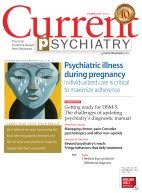Monday, August 3, 2009
Life after near death: What interventions works for a suicide survivor?
Sarah M. Jacobs, MEd
Fourth-year medical student, Mayo Medical School, Rochester, MN
J. Michael Bostwick, MD
Associate professor of psychiatry, Mayo Clinic College of Medicine, Rochester, MN
Completed suicide provokes a multitude of questions: What motivated it? What interventions could have diverted it? Could anyone or anything have prevented it? The question of who dies by suicide often overshadows the question of what lessons suicide attempt (SA) survivors can teach us. Their story does not end with the attempt episode. For these patients, we have ongoing opportunities for interventions to make a difference.
A history of SA strongly predicts eventual completion, so we must try to identify which survivors will reattempt and complete suicide. This article addresses what is known about the psychiatry of suicide survivors—suicide motives and methods, clinical management, and short- and long-term outcomes—from the perspective that suicidality in this population may be a trait, with SA or deliberate self-harm (DSH) as its state-driven manifestations. When viewed in this manner, it is not just a question of who survives a suicide attempt, but who survives suicidality.
Read full text (free access)
Listen to Dr. Bostwick explain how the 'script' of your patient's suicide attempt can help you plan effective treatment
Comment on this article
Email the editor
Is a medical illness causing your patient's depression?
Virginia K. Carroll, MD
Fifth-year resident, Departments of psychiatry and internal medicine, Rush University Medical Center, Chicago, IL
Jeffrey T. Rado, MD
Assistant Professor, Departments of psychiatry and internal medicine, Rush University Medical Center, Chicago, IL
A patient who comes to you for treatment of depression might also present with physical symptoms (such as, fatigue, nausea, balance problems, etc.) that could point to a medical illness. Endocrine, neurologic, infectious, and malignant processes and vitamin deficiencies could be causing your patient’s depression. To help differentiate various etiologies of depressive symptoms, we review common medical causes of depression, their distinguishing characteristics, and pertinent treatment issues.
DSM-IV-TR considers major depression secondary to a general medical condition to be diagnostically separate from a major depressive episode. When considering nonpsychiatric causes of depression, begin with a thorough medical history including current and past medications, illicit substance use, review of systems, and a detailed neurologic exam.
Read full text (free access)
Comment on this article
Email the editor
How to reduce distress and repetitive behaviors in patients with OCD
Elna Yadin, PhD
Research associate, Center for Treatment and Study of Anxiety, Department of psychiatry, University of Pennsylvania, Philadelphia, PA
Edna B. Foa, PhD
Professor and director, Center for Treatment and Study of Anxiety, Department of psychiatry, University of Pennsylvania, Philadelphia, PA
Exposure and response (or ritual) prevention has been shown to be effective in improving the therapeutic outlook for patients with obsessive-compulsive disorder (OCD). Yet barriers—including patient unwillingness to enter into the intensive therapy—prevent more persons with OCD from achieving an improved quality of life.
This article focuses on the clinical picture of OCD and the multifaceted cognitive-behavioral therapy (CBT) that has received the most empirical support. We also describe initiatives to make CBT more accessible to OCD patients, such as providing twice-weekly instead of daily treatment sessions.
Read full text (free access)
Comment on this article
Email the editor
Let me tell you how I feel… (Things that nag at me)

Henry A. Nasrallah, MD
Editor-in-Chief
Every psychiatrist and mental health professional encourages patients to “express your feelings.” Venting produces a cathartic effect, especially if frustrations have been harbored for a while. So I thought I should practice what I preach and tell you some things that annoy me about the contemporary state of psychiatry, which might bother some of you as well.
Why have we allowed our patients to be relocated from hospitals to jails and prisons? How were the mentally ill transformed from “patients” to “felons?” State hospitals have been shuttered, but correctional facilities are a growth industry.
Why have community-based mentally ill patients become “clients,” as if mental healthcare was a business transaction? Would cardiologists or oncologists accept labeling their patients as “clients?” No chance!
Read full text (free access)
Comment on this article
Email the editor
Subscribe to:
Comments (Atom)

